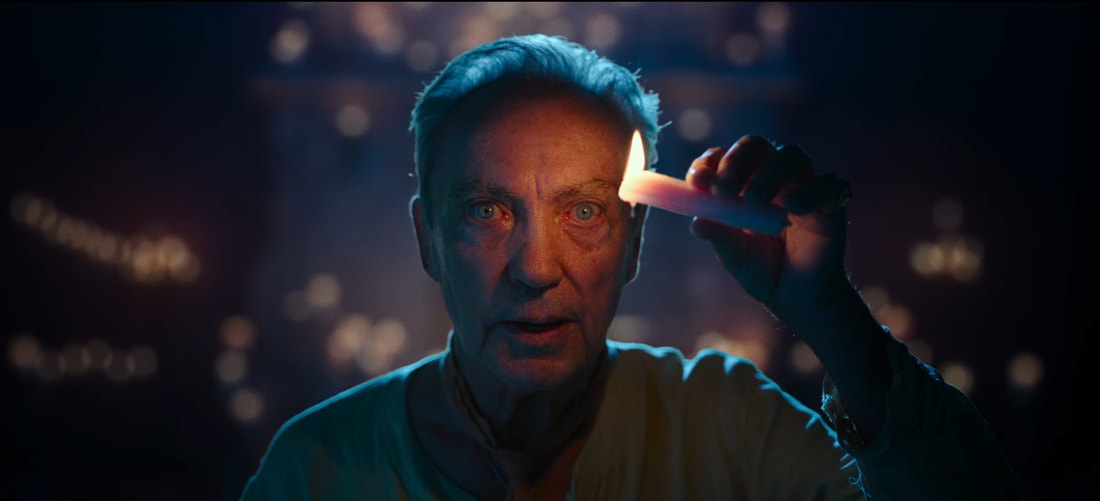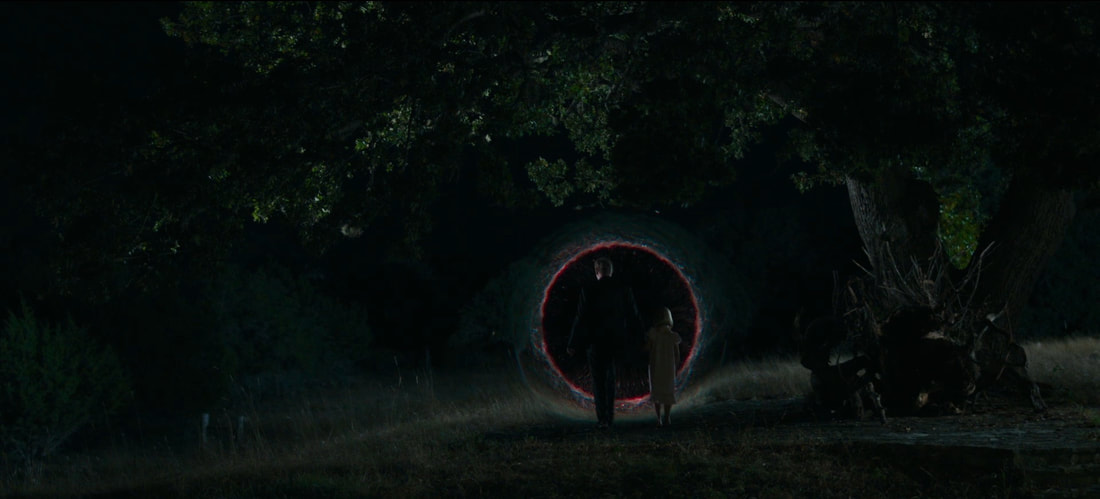|
Interview by Sean Boelman
When one thinks of the most legendary character actors working today, the name Udo Kier should immediately come to mind. Boasting an impressively large and diverse filmography, Kier is just as known for his off-the-wall and crazy bit parts as he is for his supporting roles in films by auteurs such as Lars von Trier and Rainer Werner Fassbinder.
His newest role, in Carlson Young’s twisted Alice in Wonderland-like fantasy The Blazing World, sees him more in the former category as this film’s White Rabbit. We at disappointment media had the opportunity to sit down with the iconic actor and have a conversation about the role in the film, in addition to his career as a whole. Check out the interview below!
disappointment media: You currently have 270 credits and counting on your resume. How do you keep up such an impressive output?
Udo Kier: Well, modern technology knows more about me than I do. I don't count my films. And when I talk to journalists, they always say, "It's almost 300 films," and I say, "Yes, 100 films are bad, 50 films you can watch with some good wine, and 50 films are good." And, you know, I think I did only with Lars von Trier, I did 10 films or 12, Fassbinder, and all. So there are good films, but, you know, as an actor, unless it's a director like David Lynch, you know, I'm a very lucky man, that I work with many people like Wim Wenders, like Werner Herzog, like Lars von Trier, they cannot make a bad film. They can only make a film people don't like, but it doesn't mean that it's a bad film. But there are directors who will tell you wonderful stories. And then you start working with them. And you feel something is not in my direction, and then you still have to make the film. And there are films I did I have never seen because I didn't have a good time making it. So why should I go and depress myself in the theater? So you never know. disappointment: So you mentioned that you've worked with many accomplished filmmakers, but you also leave time for up and coming filmmakers like Carlson Young of The Blazing World. What do you like about working with new talent like this? Kier: Because they have talent. You see, I myself, I have never been to acting school. And I became a professor. And the thing that I say to my students, when we had a speech, I always said, "Talent is something you cannot learn. You can learn a technique, but you cannot learn talent," which is true, then it comes to question about his style, how much you want. When Carson sent me the script, and the producer, I said, "Okay, I read it twice." You see, when I get a script, I read first my role only. And if it's interesting, then I read the whole script with my role in it. And if I'm not necessary to be there, it doesn't change the story, why should I be in the movie? So I read it twice. I liked it. And I said, "Let's meet." And we talked and spent the afternoon together, she came with the producer. And I liked her, I liked her energy. And I understood very quickly that she was not really out to make a short film, which she did, but she got her attention. People saw it, and then she found the money to make the feature film, which she had planned all the time. She hadn't planned to make a short film and then was a success, and made a feature film. So I liked her. The same thing happened to me with Todd Stephens for Swan Song. I read, he came here. We talked one afternoon, and we had details, and I made the film. So talent, I like because I know from the past, in more than 50 years, the internet knows more than I do about my life. I must say I prefer independent films. I mean, I made Blade, I made Armageddon. Imagine if I would have gone to the director and would have said, "I have an idea." They would have said "What? You have a script? What idea?" But when you are making independent films, you become as an actor, you become part of the creation also. And Blazing World it was like, I know it was fantasy and she chose me to be her fantasy. That was really a compliment, she could have asked a lot of actors. But she wanted me to be cast standing by the water, just go with my finger, "Come, come." And I liked when I went there, what was very important, I hadn't made any films because of the virus. And they guaranteed me it was 100% safe, which it was. Not 100%, let's say 90. But I went there to Texas. They tested me, I had to wait till the next morning, there was a property, a farm where everybody was staying. The food came three times a day, nobody was allowed to leave. And everybody was living there. And we made the film. And she was amazing. A young, delicate, young girl able to write, direct, star in it, and be there and listen to the actors and she's very, very creative. And that's why I'm very happy that I did the movie because she's very talented.
disappointment: You mentioned how some of your scenes in The Blazing World don't have much dialogue. What is either the challenge or the reward in acting scenes like this?
Kier: Well, you're making me a compliment, of course, I have enough possibilities to express myself without text. Text is just there to undermine something. You know, you can say, "Oh, I'm hungry." As you can also say, "Ahh, ahh, food! Food!" You know you can have your fantasy to go either direction. I don't need text as much. It's like Lars von Trier tells everybody, "Don't act." I mean, I made films with Lars where we had our self service table with Lauren Bacall, Ben Gazzara, James Caan, Nicole Kidman, Udo Kier, Stellan Skarsgård, and Lars comes up to us and says, "And don't forget, don't act." You see, it is like you don't need text. Sometimes actors they love text, I won't mention any names, and start with the back to the camera by the chimney and then they'll turn a little round and talk to the floor. And finally they come up and I always call them another Oscar speech. disappointment: So what is different in your approach of how you act in certain arthouse dramas like what you've done with Lars von Trier versus fantasy movies like The Blazing World? Kier: I prefer, of course, the fantasy because I can use my fantasy. If some director like Lars, a great director and friend, I'm the godfather of his first child and we made our first movie several years ago, but I know he doesn't like us to act. To do a drama. We just be there and have a good script and a good situation and we talk. But personally, when I did John Carpenter's film, you know and opened my stomach at the end and put my insides into the projector, like a sausage factory. I like that. Because it's so ridiculous. But you know, I don't play as ridiculous. And I don't think it's ridiculous. I think it's, you know, a person with a special mind. disappointment: So you mentioned a bit earlier how you like to take these roles that are pivotal, but small? How do you make these turns so memorable? Kier: Because the way I talk. You know, I always say, there is a way when you play a killer, you have a gun, and then you look at your partner, shoot. But I wouldn't do that. I prefer, if the director allows it, that the gun is in front of me. And I clean my fingernails and I say, "When I'm done, I'm going to kill you. Are you happy with your hair?" BANG! And people say, "That was evil!" To kill somebody is evil one way or the other. So now it's like, I read the roles. I mean, I in Johnny Mnemoic played the boss of Keanu Reeves, Ralfi. And, you know, then the Chinese people come and kill me. When you play, in short roles or small roles, not long on screen, it's very hard to keep the memory. For example, now with Swan Song, my life has changed. To get a page in the New York Times, writing, "On top after 50 years, Udo Kier finally becomes a leading man." And I was thinking, "Were they right? I made so many movies," but I had never been a lead in America. I had the lead in Germany with Dracula and Frankenstein, but never in an American production. And I was thinking why? And I know why. Because the people start with you and follow you till the end. Yeah, when I showed Swan Song, I hope people can tell me "Oh, you made us cry, you made us laugh," because they follow the personality. Or you have fantasy roles, like in The Blazing World, which are totally crazy. And he sings a song, "There are three keys. You have to open each one. But I'll tell you, they're not as nice to you as I am." You know, it's fun. And that's why when I do even commercial movies like Blade, that my teeth are going to be pulled out and I'm going to be exploding in the sun. And I said, "Great! What a great way of leaving a movie." So it's as always, I look for something interesting. I wouldn't do a movie where it's a boring part. I wouldn't do that. Never. Because especially now I'm getting older. Next week is my birthday. 77. Lucky number. I'm born on the 14th of October, two times seven is 14. So and, you know at the moment, I'm in Hunters, with Al Pacino, in eight episodes, I'm in six, and I'm still working on it. I'm flying next week to Prague to shoot three weeks and then I'm done. And so there you have it. disappointment: Well thank you so much for your time. I really enjoyed speaking with you and I can't wait to see 270 more movies from you! Kier: I know that's not going to happen, but I'm looking, because time is money, and time is to sin. I'm looking for something now for the next couple of years, which really nobody has seen. I want to, will I be able? I cannot answer that question, but I want to do something amazing. Really amazing.
The Blazing World is now in theaters and on VOD.
0 Comments
Leave a Reply. |
Archives
March 2024
Authors
All
|
|
|
disappointment media
Dedicated to unique and diverse perspectives on cinema! |


